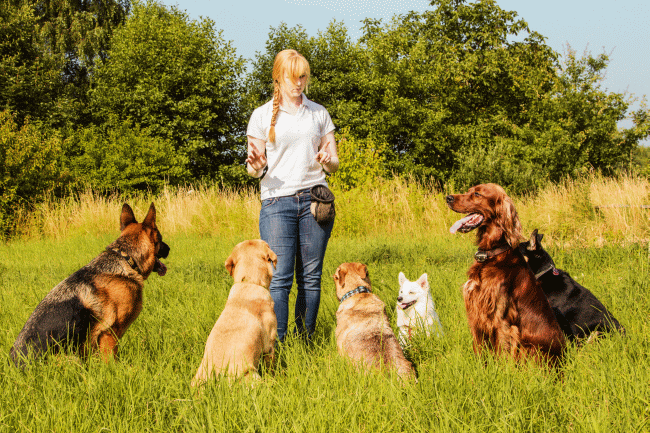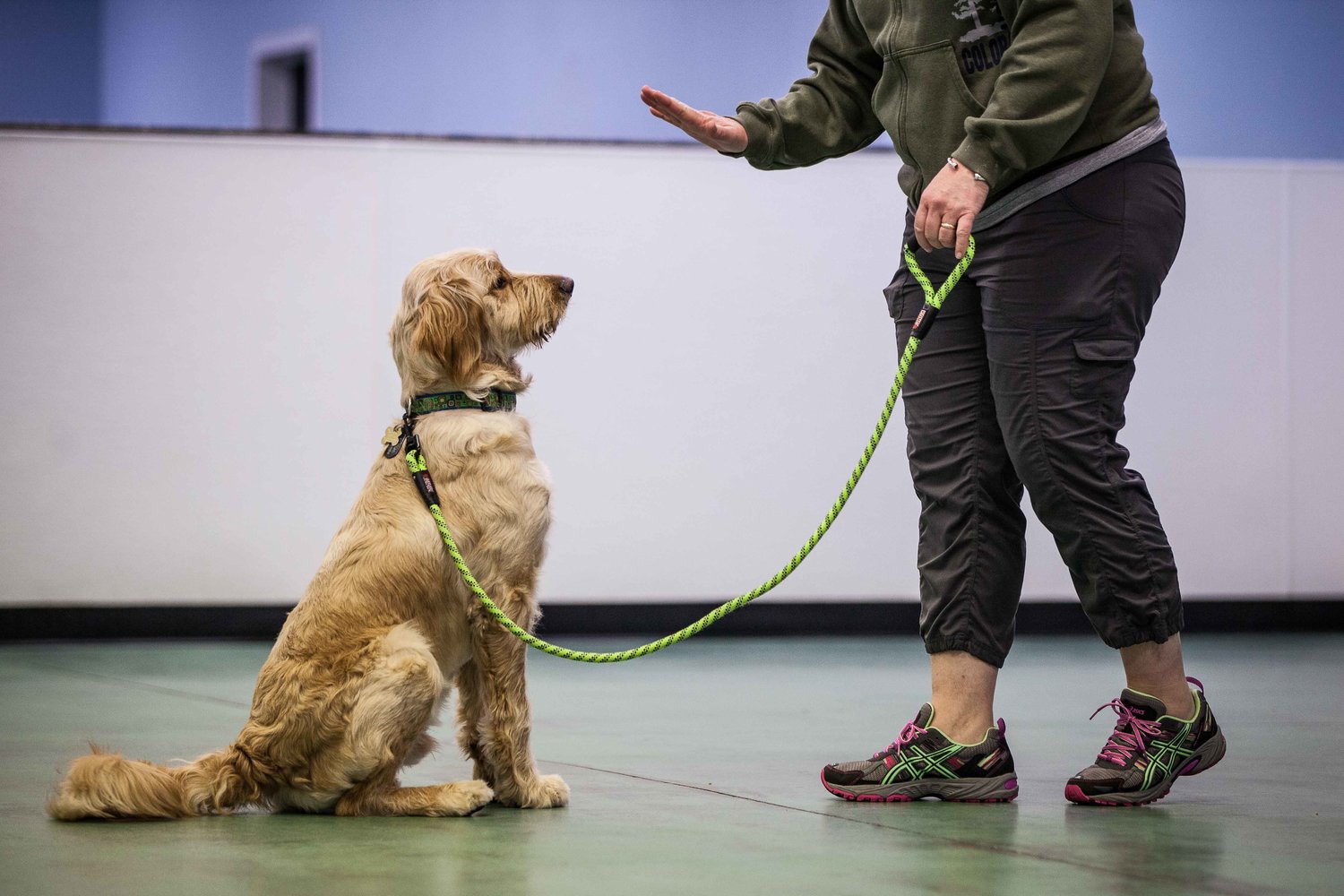Beginner's Overview to Effective Canine Training in your home
Effectively educating a canine at home requires a nuanced understanding of canine behavior and efficient interaction strategies. Developing clear training objectives, using premium rewards, and maintaining consistency across household members are important aspects. Incorporating training into day-to-day regimens can boost both involvement and retention.
Recognizing Dog Habits
Comprehending pet dog behavior is important for efficient training and promoting an unified relationship in between humans and their canine companions - Puppy Training. Pets communicate largely with body movement, articulations, and faces, making it vital for proprietors to analyze these signals properly. Recognizing habits such as tail wagging, roaring, or cring can provide insights right into a pet's emotional state and objectives
Furthermore, comprehending the all-natural instincts of canines, such as their pack mentality, helps proprietors develop management duties within the home. This is important for creating a structured atmosphere where canines really feel safe and secure and are more receptive to training. Pets are additionally influenced by their socialization experiences; early direct exposure to numerous environments, individuals, and other animals can considerably shape their actions later on in life.
Common behavior problems, such as aggression, stress and anxiety, or excessive barking, commonly stem from misconceptions or unmet demands. Observing and attending to these issues promptly can prevent rise and make sure a positive training experience. By cultivating a deep understanding of dog behavior, proprietors can tailor their training methods to fit their canine friends, ultimately resulting in a well-behaved and happy animal.

Essential Training Tools
A well-appointed training space can substantially enhance the performance of dog training in your home. Crucial training tools make certain that both the canine and the instructor can involve in efficient sessions that foster learning and bonding.

Purchasing a durable leash and a comfy, well-fitting collar or harness is crucial for safety and control. These devices help establish limits and ensure the pet stays safe throughout training. Additionally, an assigned training area, devoid of interruptions, help focus for both the fitness instructor and the pet.
Training aids such as training pads, cones, or agility equipment can also boost the experience by introducing variety and difficulties. Having a note pad or electronic app for tracking progression can be indispensable, permitting you to note successes and areas for renovation. Using these important devices will certainly create a positive training environment and lay the foundation for effective discovering.
Producing an Educating Regimen
Establishing a regular training routine is essential for reliable canine training in your home. A well-structured regular not only helps in enhancing preferred habits but also offers your pet with a feeling of protection and predictability. To develop an effective training routine, begin by recognizing specific sites training goals, such as standard commands, chain strolling, or housebreaking.
Choose a marked time each day for training sessions, ideally when your pet dog is responsive and alert. Sessions should be short, roughly 5 to 15 minutes, to maintain focus and protect against fatigue. Consistency in timing and atmosphere will improve your pet's knowing experience.
Include training into daily activities to strengthen abilities. As an example, technique commands during strolls or mealtime, which try this out integrates learning into natural regimens. In addition, remain adaptable and adjust the routine as necessary, fitting your canine's energy levels and state of mind.
Positive Support Strategies

When implementing positive support, it is important to choose rewards that are inspiring for your pet. High-value treats, such as small pieces of hen or cheese, can be particularly efficient during training sessions. Additionally, differing the incentives can keep your pet's passion and enthusiasm.
Begin with easy commands, like "sit" or "remain," and progressively progress to much more intricate tasks. Consistency is key; make certain that all family members use the same commands and incentive systems to avoid confusion.
In addition, it is crucial to remain client and avoid irritation. Pet dogs, like humans, find out at their very own pace. By promoting an encouraging training environment with favorable reinforcement, you can boost your canine's understanding experience while strengthening the bond between you and your fuzzy friend, preparing for effective training end results.
Common Training Obstacles
While educating a dog in the house can be a satisfying experience, it usually includes a collection of typical difficulties that can evaluate both perseverance and uniformity. One prevalent concern is diversion. Pet dogs may become conveniently averted by sounds, movements, or also scents in their environment, making it hard to keep their emphasis throughout training sessions.
One more difficulty is variance in commands and support. If relative utilize different cues read the article or rewards, it can impede and puzzle the canine progress. Establishing a unified method is important for effective interaction.
In addition, pets can experience aggravation or stress and anxiety, particularly if they do not recognize what is anticipated of them. This can lead to unfavorable behaviors, such as barking or eating.
Lastly, the timing of support is vital. Delayed rewards can decrease the efficiency of favorable support, as pet dogs might fail to attach the actions with the reward.
Overcoming these difficulties calls for commitment, clear interaction, and an organized training plan - Puppy Training. Recognizing and dealing with these common challenges will lead the way for a much more effective and enjoyable training experience at home
Conclusion
In final thought, effective pet dog training at home demands a thorough understanding of canine behavior and reliable communication approaches. By establishing clear training goals and utilizing premium deals with along with favorable reinforcement, the training process becomes extra satisfying for both the dog and the fitness instructor.
Establishing a consistent training regimen is crucial for effective pet dog training at home.Positive reinforcement techniques are basic to reliable pet dog training, advertising preferred actions with incentives rather than punishment. By fostering an encouraging training setting via positive support, you can boost your canine's learning experience while enhancing the bond in between you and your hairy friend, laying the groundwork for successful training results.
In final thought, successful dog training at home requires a comprehensive understanding of canine actions and efficient communication methods. By establishing clear training goals and utilizing top notch treats together with favorable reinforcement, the training procedure ends up being much more rewarding for both the fitness instructor and the pet.